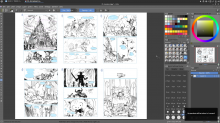The whole overview/logic/design/potatoes of the thing can be read here: http://wolthera.info/?p=807
Usage:
- Download this:
- go to the resources folder and make a folder named "pykrita".
- Unzip the file in there.
- Restart Krita and while waiting for Krita to initialise, go inside the cpmt folder and open+read the README.md, which contains further usage instructions and a todo list at the end with known bugs.
If you get exceptions or windows or weirdness, copy+paste them here into a comment. Other comments can also go into a comment. I won't be on IRC on Monday 21st.
IMPORTANT This relies on master being up to date.

